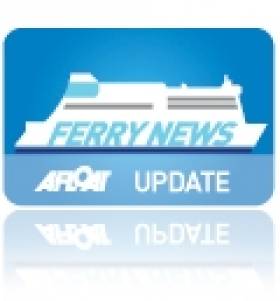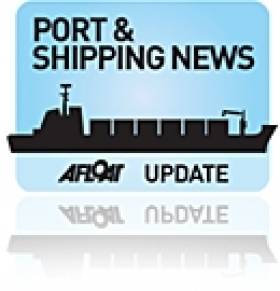Displaying items by tag: Associated British Ports
Restructured Fastnet Line Reduce Year Round Service to Seasonal Schedule
The discontinued winter sailing schedule for this year is also expected not to be repeated during October 2012-March 2013. Fastnet Line's decision to make the Celtic Sea route into a shoulder season and summer only service follows a similar path taken by Stena Line which withdrew Dun Laoghaire-Holyhead (HSS) sailings in mid-September, for report click here. The central corridor route is due to reopen sometime in April or May 2012.
Cork City and County council and Kerry County council have provided €700,000 to support Fastnet Line and yesterday they announced an additional €150,000 in co-funding for the period of the examinership. In order to stabilise finances the ferry company are to radically reduce passenger capacity of the Julia (see photo) from 1,500 down to 950. This is in line with the capacities of the Julia serving 'night' sailings.
She has a crew predominately from Eastern Europe and Irish and UK deck officers. The Bermuda flagged, Hamilton registered vessel is currently berthed at Ringaskiddy Ferry Terminal, Cork Harbour. At 154m she is the largest ferry to date capable of berthing in the limited confines of the swing basin in Swansea and with a draft of 5.8m in a port which is subject to a large tidal range on the Bristol Channel.
Operating costs on the 10 hour service has been severely hampered by continuing increases to world oil prices. From the year 2010 to this year, fuel costs rose by 27% and almost 50% from the original budget of 2009. The company claims that each crossing amounts to €18,560 alone in fuel costs.
Fastnet Line to date has carried 150,000 customers, of which 75% have originated from the UK market, generating on average €350 per person (€40m approx) exclusive of fare and on-board spend. This crucial market is core to the success of the company's direct 'gateway' route to scenic south-west Ireland, with Swansea connected to the M4 motorway linking midland population centres and London. The operator claims a saving of 600km driving based on a round trip compared to using rival ferries running on routes to Rosslare from Pembroke Dock and Fishguard.
Since the reinstatement of the service in March 2010, after Swansea Cork Ferries pulled the Superferry (photo) off-service in 2006, the loss to tourism generated revenue on both sides of the Celtic Sea was estimated to be £25m per annum according to the Welsh Assembly and a similar figure recorded in the Cork and Kerry region.
The company also outlines the reduction in carbon emissions saved from operating the only direct service specifically connecting the regions of Glamorgan and Munster. Some 500,000 freight miles alone were saved in the Welsh region since the service started instead of using alternative route running from Pembrokeshire ports.
- Cork Harbour
- west cork
- port of Cork
- Celtic sea
- Cork City council
- Fastnet Line
- M.V. Julia
- M4 motorway
- Kerry
- Irish High Court
- Stena Line
- Ports and Shipping News
- cork harbour news
- Ferry news
- HSS
- Welsh Assembly
- Cork County Council
- Associated British Ports
- ABP
- Ringaskiddy Ferry Terminal
- M.V. Superferry
- SwanseaCork Ferries
- SCF
- Fastnet Line Group
- Kerry County Council
- HSS Dun LaoghaireHolyhead sailings
- Glamorgan
- Munster regions
- Bristol Channel
- Bristol Channel tidal range
- Swansea Port
- Irish tourism sector
- Pembroke DockRosslare
- FishguardRosslare
Dundalk Dredger Docked in Dublin Port Is Up for Sale
The Dublin Port Company has sought expressions from interested parties in undertaking the remaining activities of the port on an exclusive basis.
The Dundalk registered dredger arrived to the capital port on 14 July where she remains berthed at the Bulk Jetty in Alexandra Basin. Her previous owners, the Dundalk Port Company were unique in that they were the only port company to own and operate a dredger in the Republic. For many years the 757-tonnes dredger has carried out numerous contract assignments in ports throughout the island of Ireland including work on the Samuel Beckett swing-bridge and the most project was at Queens Quay, Belfast on the Lagan close to the city-centre.
Hebble Sand was launched by Richard (Shipbuilders) of Lowestoft for British Dredging and later used by Associated British Ports to serve a network of UK ports. Despite her age, the near fifty-year-old veteran vessel has been kept in excellent condition and this was evident during a rather unusual appearance for a ship of her type when attending the Dublin Docklands Maritime Festival in 2009.
She was made open for the public amongst the tall-ships that lined the Liffey Quays. Such an initiative was inspiring as it provided a rare opportunity for the public to access such a dredger which otherwise is not familiar compared to the popularity of visiting tall-ships and naval vessels.
The only other port to operate their own dredger is Londonderry Harbour Commissioners, whose Lough Foyle has worked on projects outside her homeport. This has included work at the new £40m Stena Line ferryport terminal on Loch Ryan close to Cairnryan and is due to open in November.
- Dublin Port
- Dublin Port Company
- Dundalk Port Company
- Stena Line
- Port of Dublin
- Ports and Shipping News
- Alexandra Basin
- Ferry news
- Dundalk Port
- Samuel Beckett Bridge
- Dredger Hebble Sand
- Dredger Lough Foyle
- Londonderry Harbour Commissioners
- Samuel Beckett SwingBridge
- Cairnryan ferryport
- Loch Ryan ferry terminal
- Associated British Ports
- ABP
- Richards Shipyard
- Queens Quay Belfast
- Dublin Docklands Maritime Festival 2009






























































